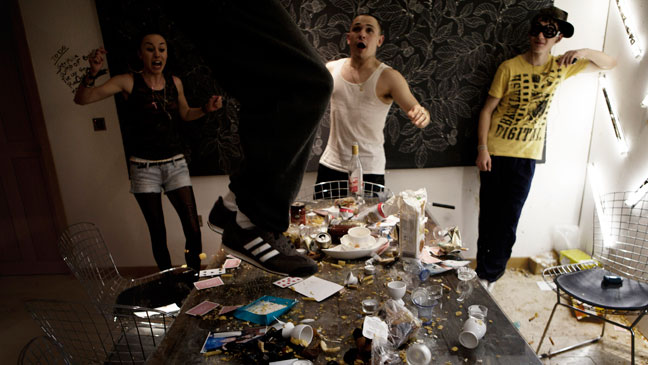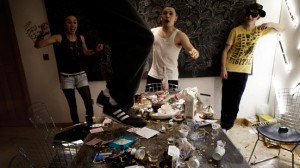Dollhouse | Berlin Film Festival 2012

This year, acclaimed Irish scriptwriter Kirsten Sheridan (Disco Pigs, August Rush) presents feature drama Dollhouse. The film revolves around a night of adventure for a group of teenagers – Denise, Darren, Eanna, Shane and Jeannie. Five friends break into an empty house in a rich neighbourhood and trash everything. They consume alcohol and drugs, deride the posh lifestyle and immerse themselves in general debauchery and teenage rascality.
As it later turns out – the house belongs to Jeannie, who is the most silent and mysterious of the gang. She is different from the rest of the kids, clearly better educated and with an upper class background – why she chooses to spend her time with this lot, and even allow them to destroy her home, is something we are left to ponder. When Jeannie’s ex-boyfriend Robbie unexpectedly turns up at the door, even more questions arise. He too does not understand a thing – Jeannie mysteriously disappeared a year ago, now suddenly back in the neighbourhood with a group of lower middle class delinquents who cannot speak a sentence without swearing.
Do not expect any explanations – that is the main thing Dollhouse lacks. The whole narrative is built on a bunch of MacGuffins and set up in a way that promises some sort of delayed pay off – a revelation of a secret that Jeannie has been hiding. This revelation (which I will not spoil) is as bizarre as it is disappointing, especially after hearing a good half an hour of “Come on, Jeannie, tell us your story!” that does not build up in any particularly exciting way. Instead, it feels like the whole sequence of events is unnaturally staged, and the deliberate deprivation of background and context to the story of these five kids is so pronounced, that it almost seems it is there only to hide the fact that there is no context worked through at all. In the case of Dollhouse, it is not a matter of leaving some questions unanswered to give viewers the freedom of interpretation – it is more like stubbornly refusing to provide anything interpretable at all.
However, Dollhouse is not really about telling us anyone’s story. It is an observation of dynamics and power relations within the group of people each vulnerable in their own way, and about the mood and atmosphere of here and now, which keeps shifting with every stupid joke they make or secret and confused glance they throw each other’s way. The performances are therefore what we are left to focus on, but then again, they are constructed using fast-paced music video style editing to disguise the fact that the actors did not really have any dialogues to perform. It remains a mystery to me what sort of clues they built their characters on at all, given that the characters have depth and certain authenticity (especially Denise, played by Kate Brennan).
Kirsten Sheridan’s Dollhouse leaves us with a handful of impressions, reminiscent in their storytelling style of the early works of Lynne Ramsay. If we keep digging for meaning, we will probably find it. However, the film did not convince me of being worthy of such effort.
Verdict: •••
Ruta Buciunaite

























Facebook
Twitter
Instagram
YouTube
RSS